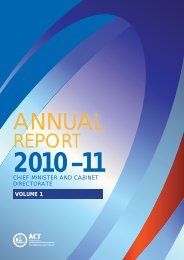Governing the City State - Chief Minister and Treasury Directorate ...
Governing the City State - Chief Minister and Treasury Directorate ...
Governing the City State - Chief Minister and Treasury Directorate ...
You also want an ePaper? Increase the reach of your titles
YUMPU automatically turns print PDFs into web optimized ePapers that Google loves.
players to deliver public services 59 <strong>and</strong> a change from <strong>the</strong> language of customers to that ofcitizens. 60 The nub of <strong>the</strong> arguments underpinning public value management is that:public services can add value to society in <strong>the</strong> same way that private for-profit organisationscreate value for <strong>the</strong>ir shareholders <strong>and</strong> o<strong>the</strong>r stakeholders. By implication, public interventionshould be circumscribed by <strong>the</strong> need to achieve positive social <strong>and</strong> economic outcomes for<strong>the</strong> citizenry. What is <strong>and</strong> what is not public value should be determined collectively throughinclusive deliberation involving elected <strong>and</strong> appointed government officials, key stakeholders61<strong>and</strong> <strong>the</strong> public.Public value is <strong>the</strong> shared value produced by governments for society as a whole through <strong>the</strong>services it provides <strong>and</strong> <strong>the</strong> legislation it develops. “As a general rule <strong>the</strong> key things whichcitizens value tend to fall into three categories: outcomes, services <strong>and</strong> trust”. 62 In caseswhere governments are delivering services directly to individuals “both <strong>the</strong> citizenry <strong>and</strong> <strong>the</strong>clients consume value produced by government, but each receives a different type of value.The citizenry receives public value, whereas clients receive private value”. 63 It should beremembered that in a public value paradigm political processes are <strong>the</strong> “final arbiter of publicvalue just as private consumption decisions remain <strong>the</strong> final arbiter of private value”. 64It must also be kept in mind that:Information, consultation <strong>and</strong> active participation are not a replacement for governmenttaking initiatives or deciding. Government has a leadership role, <strong>and</strong> citizens expectgovernment to fulfill it – after all, that is why <strong>the</strong>y voted it into office. The question, however,is less whe<strong>the</strong>r to lead than how to lead. 65This changing role for government requires a move from rowing to steering, underpinning <strong>the</strong>need to broaden policy development beyond traditional closed public service processes:“governments cannot remain as firmly in control of <strong>the</strong> policy decision-making process as<strong>the</strong>y have in <strong>the</strong> past <strong>and</strong> at <strong>the</strong> same time continue to move toward a more facilitative orenabling role”. 66The impact of this changing approach to governance is reflected in <strong>the</strong> observations inCommunities@Work’s Submission that:59 Edwards, M. (2008) Participatory Governance. Corporate Governance in <strong>the</strong> Public Sector: An Evaluation of its Tensions,Gaps <strong>and</strong> Potential - Issues Paper No 6. University of Canberra, Canberra, p.2.60 Evans, M. (2009) “Gordon Brown <strong>and</strong> public management reform - a project in search of a 'big idea'?” Policy Studies.30(1): 33-51 p.35.61 ANZSOG Institute for Governance (2009) p.6.62 Kelly, G., Mulgan, G., <strong>and</strong> Muers, S. (2002). Creating Public Value: An Analytical Framework for Public Service Reform.Cabinet Office Strategy Unit, London.http://webarchive.nationalarchives.gov.uk/20100416132449/http://www.cabinetoffice.gov.uk/strategy/seminars/public_value.aspx p.4.63 Alford, J. (2002) “Defining <strong>the</strong> Client in <strong>the</strong> Public Sector: A Social-Exchange Perspective” Public Administration Review62(3) pp.337-346, p.339.64 Moore (1995) cited by Alford, J. & O'Flynn, J. (2009) 'Making Sense of Public Value: Concepts, Critiques <strong>and</strong> EmergentMeanings' International Journal of Public Administration. 32(3) pp.171-191, p.177.65 Organisation for Economic Co-operation <strong>and</strong> Development (2001) Citizens as Partners: OECD H<strong>and</strong>book on Information,Consultation <strong>and</strong> Public Participation in Policy Making. Paris, pp.22-23.66 Edwards, M. (2002) “Public Sector Governance — Future Issues for Australia”. Australian Journal of Public Administration.61(2):51–61. pp52, 57-58.<strong>Governing</strong> <strong>the</strong> <strong>City</strong> <strong>State</strong>: 62



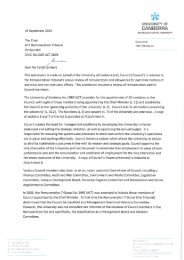
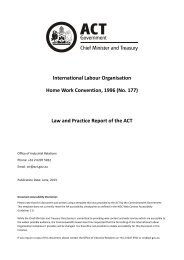
![HSR Training Programs Guidelines [ PDF 191KB]](https://img.yumpu.com/51348280/1/190x245/hsr-training-programs-guidelines-pdf-191kb.jpg?quality=85)


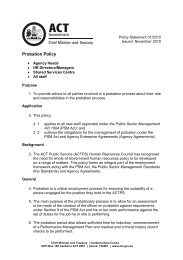
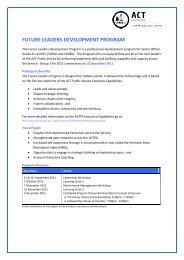


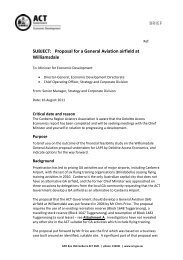
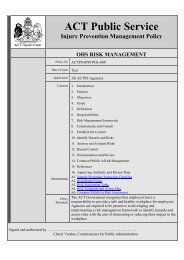
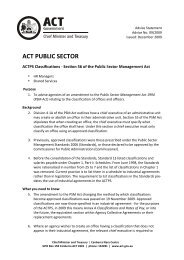
![Teachers Technical and Further Education [ PDF 68KB]](https://img.yumpu.com/34230751/1/184x260/teachers-technical-and-further-education-pdf-68kb.jpg?quality=85)
